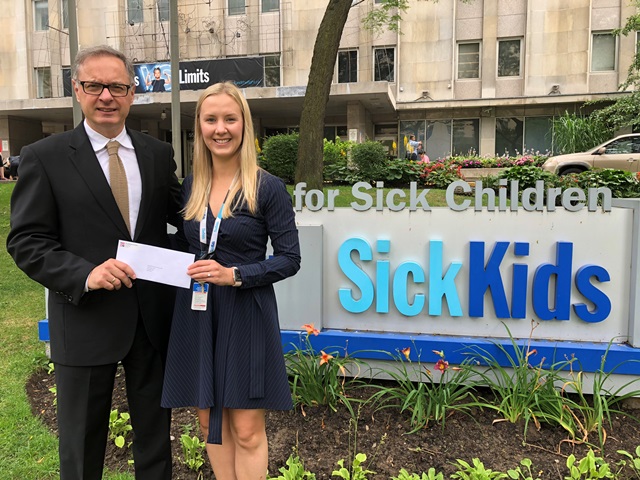
By Dr. James Douketis
A Neurology Stroke Fellow at The Hospital for Sick Children (SickKids) in Toronto is looking to the past to reveal critical data to help her refine guidelines for the use of antithrombotic therapy in children with congenital heart disease (CHD) and arterial ischemic stroke (AIS).
Dr. Elizabeth Kouzmitcheva was recently awarded the 2018-2019 Thrombosis Canada-CanVECTOR Research Fellowship that provides funding for this much needed study into the use and safety of blood thinners in paediatric patients for secondary stroke prevention. Her work will involve reviewing clinical and radiological data of more than 200 patients with cardioembolic stroke, enrolled in the SickKids Paediatric Stroke Registry since 1995, founded by Dr. Gabrielle deVeber.
Paediatric stroke has emerged as a major contributor to brain injury in infancy and childhood. In Canada, one in every 100 children is born with CHD. Anticoagulant (blood thinner) treatment is routinely recommended for children with CHD and cardioembolic stroke due to a high risk of stroke recurrence. However, no evidence-based trials have addressed anticoagulation use in paediatric cardioembolic stroke due in part to safety concerns. Dr. Kouzmitcheva’s research project is expected to provide crucial safety data that will translate into better care for these infants and children.
“We are thrilled with the caliber of applicants that we received for this year’s fellowship, as they gave the committee a lot to consider” says Sudeep Shivakumar, MD, the Thrombosis Canada Fellowship Committee Chair. “In the end, we decided that Dr. Kouzmitcheva’s research project was an opportunity that we didn’t want to miss as it will provide a valuable new piece of evidence in an underserved population.”
Dr. Kouzmitcheva says that while up to 25 per cent of children with CHD experience stroke, there is no solid safety and efficacy evidence behind the use of blood thinners that are used to treat and prevent blood clots in children with cardioembolic stroke. “Currently, we use many of the same blood thinners in children with CHD as we do in adults, based on data extrapolated from adults and from our own experience,” she says. “But what we really need to inform best practices, are new paediatric studies to be done so that guidelines can be refined, and we actually have evidence of safety in the use of such therapies in this population of children.”
A researcher is looking to refine guidelines for the use of antithrombotic therapy in children with congenital heart disease and arterial ischemic stroke.
While past studies have shown a higher risk of stroke occurrence for CHD patients when blood thinners are not used, Dr. Kouzmitcheva says the studies have limitations in examining the types of anticoagulants used, dosing and efficacy.
“It is more about understanding the risks versus the benefits of anticoagulation in these populations. Children with CHD typically have a higher risk of clotting as well as bleeding as they can experience numerous corrective surgeries and procedures and need blood thinners to prevent clots in their heart, body and brain.”
“We know that not every type of CHD is the same and certain types of CHD can predispose a child to cardioembolic stroke or are associated with a higher risk of cardioembolic stroke than others,” adds Dr. Kouzmitcheva. “There’s still an uncertainty in using blood thinners – both with the risk associated with bleeding in the brain and body, and in knowing what types of CHD will benefit the most from this type of therapy. This research hopes to provide evidence in paediatric patients that there is safety in the therapy such children are receiving.”
Since its inception in 1993, the Thrombosis Canada – CanVECTOR Fellowship has provided a springboard to launch the careers of aspiring young researchers. Previous recipients of this award have gone on to carry out internationally recognized research in thrombosis and become international leaders in this field. We look forward to following Dr. Kouzmitcheva’s career, learning of her research and how it will benefit children in the prevention of stroke and other thrombotic vascular disease.
Dr. Kouzmitcheva agrees. “With the funding of this research, we feel the scientific knowledge that can be gained will hopefully impact children in Canada and around the world.”
Dr. James Douketis is the President of Thrombosis Canada and Director of the Vascular Medicine Program at St. Joseph’s Healthcare, Hamilton.

